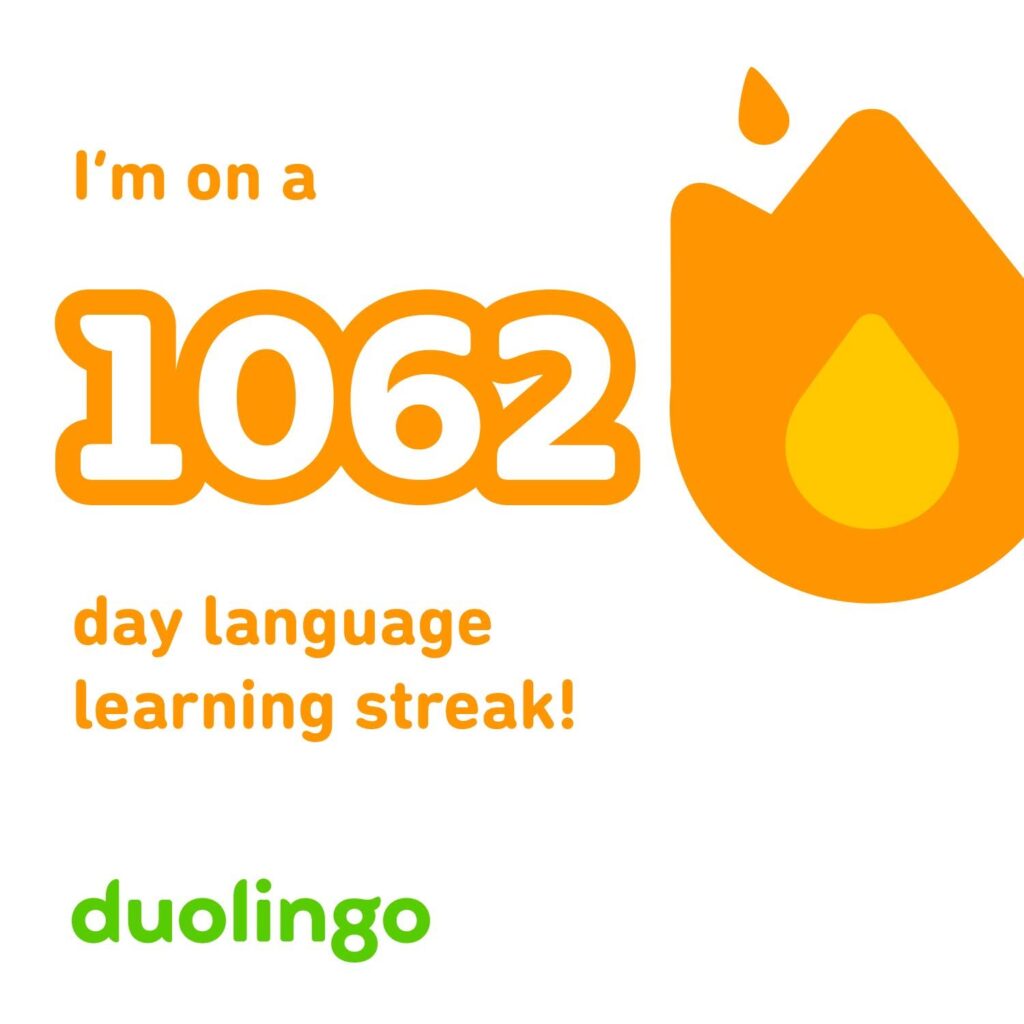
Even I am surprised at my persistence!
I’m still studying Japanese, but my lack of kanji memorization is slowing me down, and I haven’t been making the flash cards from my notes to get to the level I need to be at. But I’m not giving up, either…

Hints on how A.E. Graves spends her imaginary spare time

Even I am surprised at my persistence!
I’m still studying Japanese, but my lack of kanji memorization is slowing me down, and I haven’t been making the flash cards from my notes to get to the level I need to be at. But I’m not giving up, either…
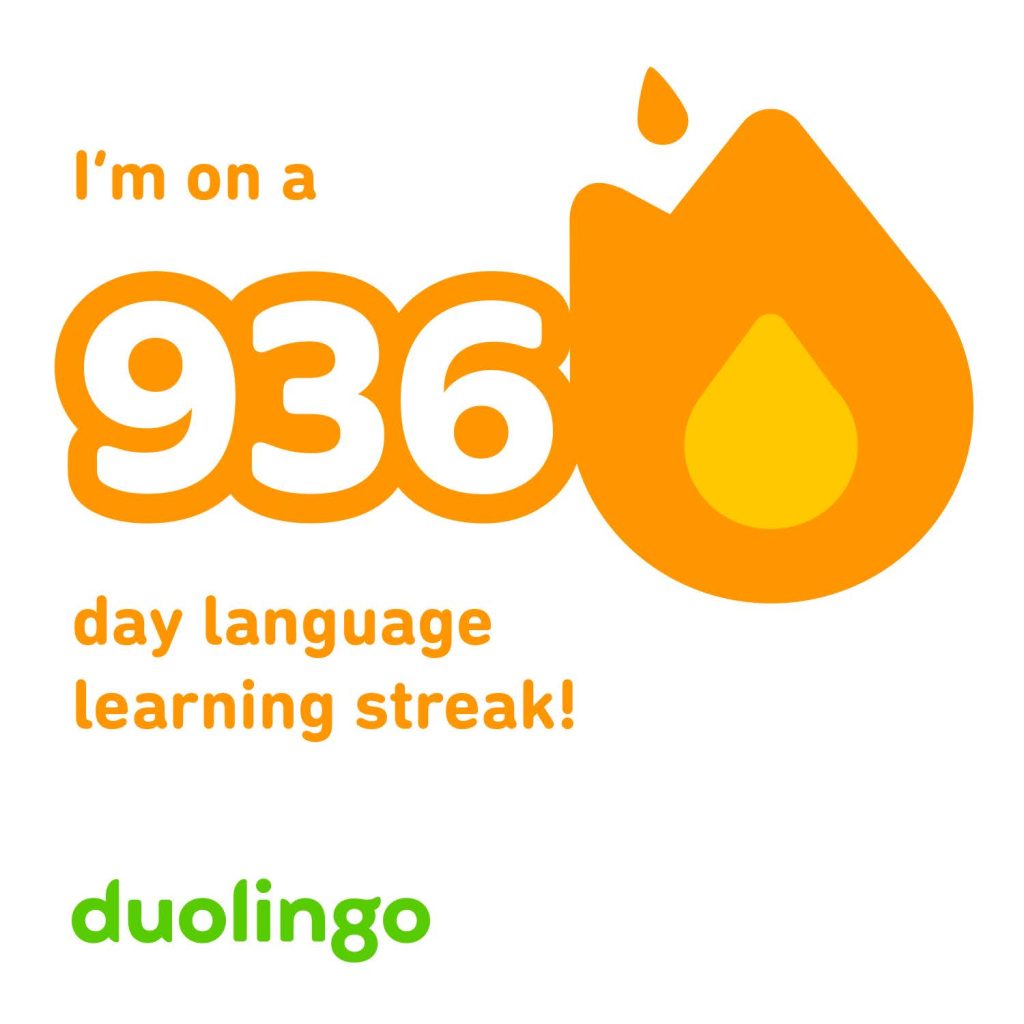
And Duolingo gives me a chance to brag about it EVERY SINGLE DAY! (Well, every day I study, which is the same thing.)
Also, if I haven’t mentioned this since switching from other languages to Japanese: Japanese is difficult for me! My reaction when the program shows me an exercise is:
I’m still struggling so much over the little connectors, like [o], [ni], and [te/de]. I still fail to see the pattern of when they are appropriate, but… hopefully I’ll get there.
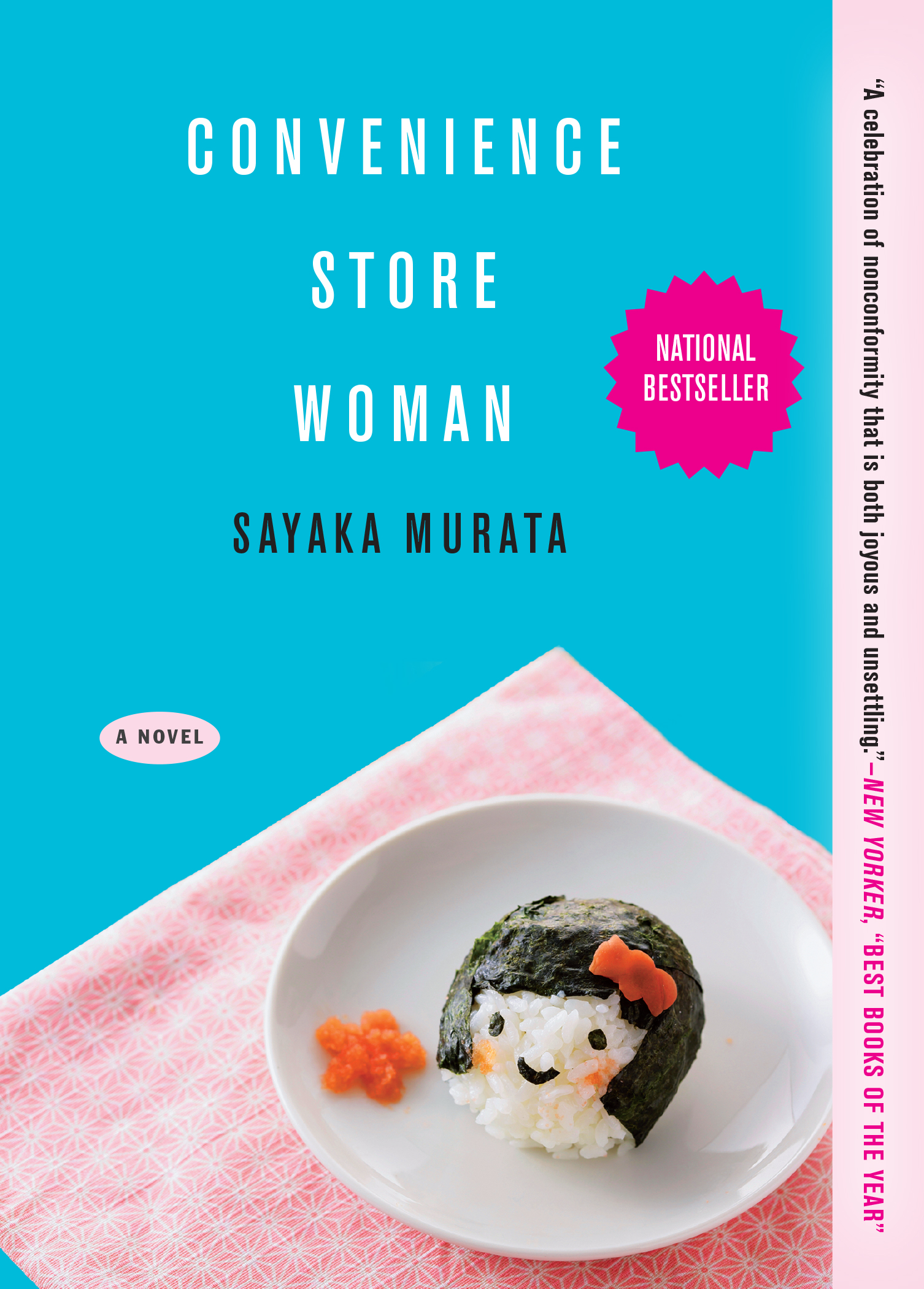
Convenience Store Woman
by Sayaka Murata
translated by Ginny Tapley Takemori
published in English by Grove Press (Grove Atlantic)
2016 (Japanese) / 2018 (English)
This is a compact, engrossing novel about a woman who has never quite fit into the rigid expectations of her family or society.
While convinced she is quite logical, Keiko sees that her behavior creates distress, especially for her beloved younger sister. Keiko learns to adjust her public self by mimicking those around her – their mannerisms, accents, clothing choices, figures of speech… And everyone seems satisfied and a bit flattered by how well she fits in – up to a point. Her continued work in a Japanese convenience store and single status remain unacceptable, though both suit her.
Ultimately, to appease her sister and others, she announces the end of her single status. The absurdity of misplaced satisfaction of those around her comes into the starkest possible relief.
The reviews I’ve read of this book discuss how “quirky” and “eccentric” the lead character is, but I suspect more. Those of us with friends ‘on the spectrum’ may read more into her viewpoints, and see Keiko as advocating for the liberation of neurodivergent people on their own terms.
It’s a great, short novel, and I love the frequency in which variations of ‘unnerving’ or ‘unsettling’ come up in the reviews!
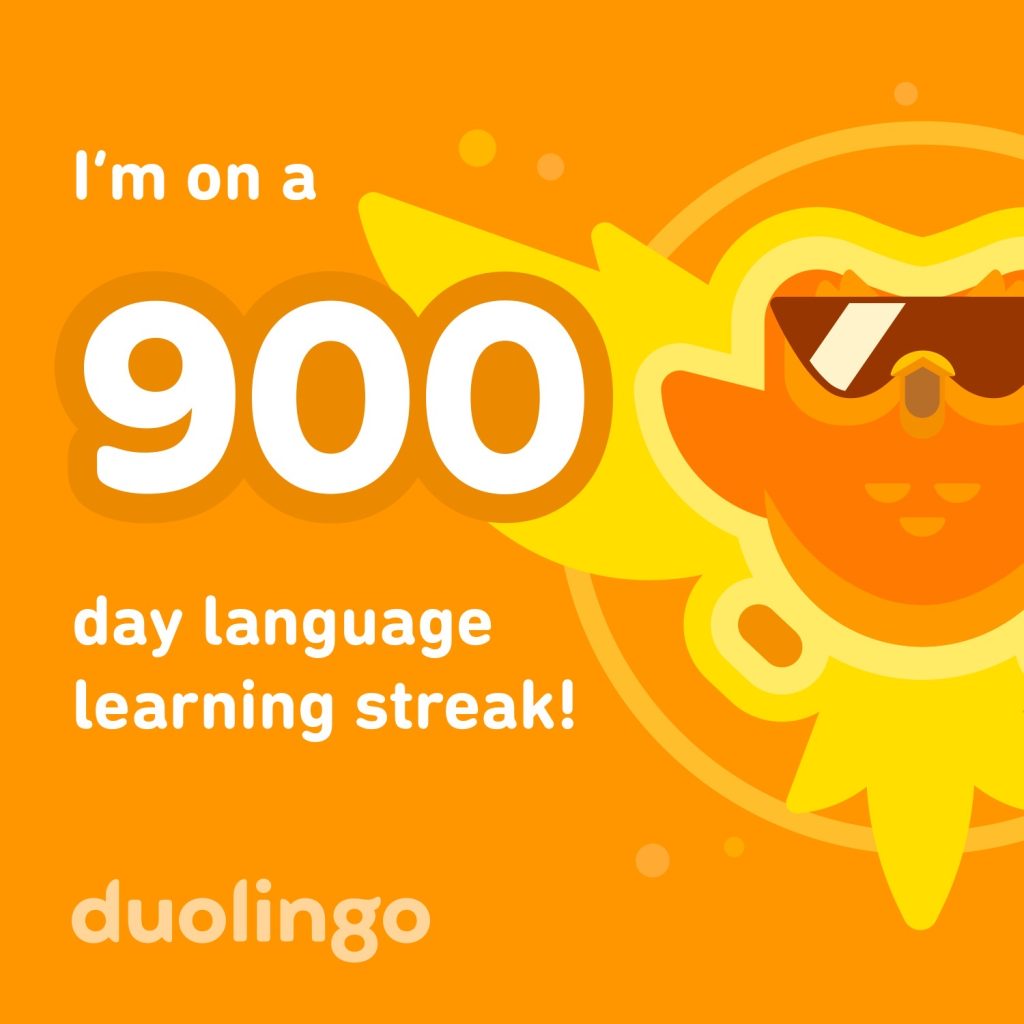
I continue to recommend this app/website/team for your language practice adventures.
Most of my Duolingo practice days have been devoted to refreshing my German, but I have also been using the Japanese course (which I’ve already gushed about).
One thing I especially need is writing practice, so my Japanese notes will be more legible. For this, I’ve recently started using the downloadable writing practice sheets at japanese-lesson.com. I also have a brush pen, which should help with some of the subtle points, curves, and flourishes on the characters, if I ever get good enough to include them!
The site includes writing practice sheets for Hiragana, Katakana, and Kanji. (I’m providing a link to the Hiragana page, but you can easily navigate to the others.)

Studying a language for fun at your own pace is a great thing. It’s great that it is possible, and that so many people are working hard to make studying fun!

Having been unable to travel for so long due to the COVID-19 pandemic, I have a wicked case of wanderlust.
Some of my wanderlust is just caused by escapism: I’m dealing with lots of dull obligations, so the appeal of being AWAY is as alluring as the idea of specific places I may enjoy! I know myself well enough to recognize this, and am evaluating my fantasies carefully, to see what they are REALLY about.
As part of thinking about why I travel, I’ve been reading my writing about past trips, from my first, solo, trans-Pacific trip (to Japan) to my more recent writing about my taxing, trans-Atlantic business travel, where I was able to convey both the hardships AND the glamour.
That first solo trip was an amazing experience, but writing about it while I was sick with a persistent case of bronchitis skewed my reporting. Writing to friends who didn’t share my interests in art narrowed it further. I managed to convey the difficulties well, but not the gorgeousness of misty paths leading to ancient shrines in wet, shady forests, or the beauty of clouds clinging to mountain tops, or the satisfaction of soaking in deeply sulfurous waters… While my friends (fairly) interpreted my writing as disappointment, and I did describe negative experiences and states of mind, I still enjoy memories from that trip: of oversized leaves that fell so noisily while I sat in a forest, lush carpets of moss in a chess-board-like temple garden with stone lanterns as chess pieces, the unexpected appeal of my German hiking companion as he boarded his departing train, the hot lemon drink that warmed me when I was rain-drenched, the bliss of soaking up to my neck in deep hostel bathtubs that I didn’t describe…
The frustrations of the noisy crowds and the jostling students are also vivid, but are less important now: that wasn’t my only trip to Japan, that wasn’t my only visit to those sites in Kyoto, and my subsequent experiences at popular tourist sites mean I understand the limits of what they can and can’t offer me in a way I didn’t at the time.
That trip helped me see and accept what popular mass tourism is. I accept that there are lists of “must-see” destinations (which I don’t actually have to see), and that some of those destinations may be worthwhile if I am willing to accept the consequences of their popularity. (This has also led to my intentional photo series of tourists taking photos at crowded sites, which I enjoy making, and which are only possible due to the nature of such sites.) Accepting this helps me make more informed choices about opting-in AND opting-out. I freely do both.
*
My business travel was also highly educational. Being overseas as part of an initial team that dispersed at the end of the business day/week, leaving me unexpectedly alone in a new place, I had to orient myself, and then decided to use my newfound knowledge to orient others. I recognized and appreciated the collegiality of someone with more experience there, and ensured I repaid that collegiality when our project changed sites, and that I followed his example in general. I knew what kinds of social and logistical support I had wanted, and I provided that to those who followed.
I gave tours, and took newcomers to my favorite spots if they shared my interests; I wrote a brief visitors guide; I recommended restaurants, dishes, beer, museums, hotels; I met up for meals with colleagues who didn’t want to dine alone; I translated; I learned train lines, bought tickets, and guided colleagues to work, and in doing so, expanded the practical hotel range for a suburban office with a limited pool of hotels, so my colleagues could spend time in a world-class city rather than sit in a remote, rural hotel at night; I took colleagues on field trips… That felt GREAT! I felt useful, I made things easier, I enjoyed good company, I had good fun.
With multi-country business trips that spanned several weekends, I had a chance to learn about different approaches to exploring: about how to use hotels (the sort that are too cramped to linger in, and the sort that are a pleasure and destination of their own); how to pace myself based on my energy levels, moods, and the weather; how to go away for a weekend; and how to stay put.
Both on business and on my vacations, I learned about the complexity of traveling with others. Of how the wrong traveling companions complicate a trip, and the right ones make my experience of a destination better than I could have managed on my own. This last point is the best lesson: I do have a few friends whose company is great ON THE MOVE, and I should experience places with them more often!
I’ll now return to my daydreams (and online research and list-making) of safe and enjoyable travel, with expectations well grounded by my actual travel experiences…
I mentioned before that I don’t write about EVERYTHING I read recreationally, because I don’t strongly recommend everything I read. I wouldn’t feel great about spending my time dwelling on things I didn’t enjoy.
There’s a web comic site that’s been advertising on Twitter, and I eventually caved and logged in to see what they have. Their ads are promoting a tale about an abused, sheltered heroine who was married off to an ab-heavy giant who doesn’t communicate well. She is terrified by everything and requires constant rescue. That is… NOT my cup of tea – I love competence (though I’ll settle for high spirits or a good attitude). The drawings are cute, but you will not read about that here.
Likewise, there’s a well-drawn manga I’ve never mentioned here, which packed the first collection I bought with adventure, but… the story got derailed somewhere in the second collection by the artist’s obsession with looking up all the girls’ skirts and gratuitous shower scenes. Later chapters seem to be mostly shower scenes? I know the conventions of awkward falling and “it’s not what you think” physical humor, and I have laughed at good versions of that (it’s possible!), but this one is just about drawing girls’ private parts now. I’ve given up, won’t buy more, etc.
It’s still fun to write about books and stories that impress me, so I’ll stick to that! 🙂

Yes, for some of us, nearly every day is World Postcard Day, thanks to the hard work of our postal services! There is also a SPECIAL day for those of us who aren’t already sending and receiving them regularly! The winning design for the card this year is cute, and everyone likes to receive a note in the mail. Try it!
The Duolingo app is still a regular habit of mine! I’ve been using it in different ways for different languages, and with even more practice behind me, my favorable opinions have grown even stronger.
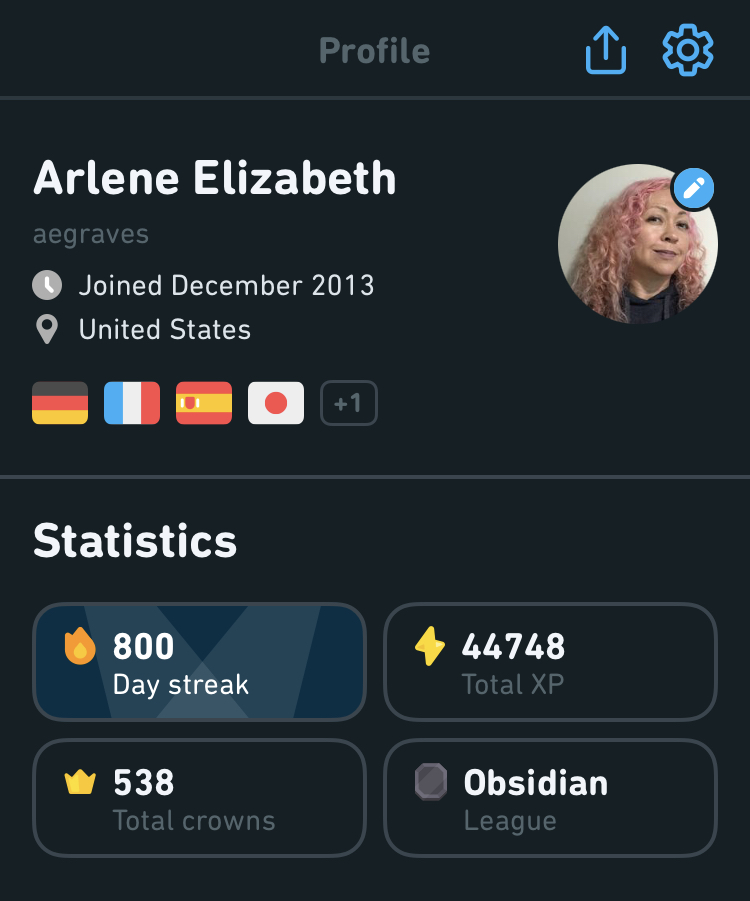
During the course of my studies, Duolingo has been adding lessons and improving exercises. I appreciate and like the improvements, which I feel have increased my understanding of topics like verb tenses.
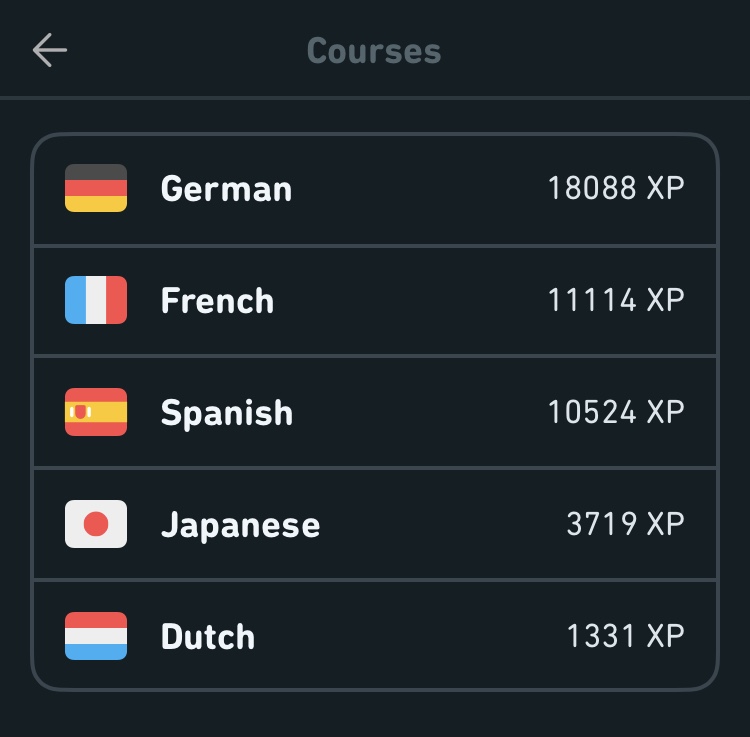
German is the language I still use the most, and it is the one I have completed all of level 1 for. I have pen pals who don’t speak English, and this has increased my need to be able to write skillfully and expand my vocabulary. Duolingo introduces practical topics that are more current than the lessons I learned so long ago. (I remember the word for reel-to-reel tape player, because I had some old books – I’m trying to move AWAY from that!) I’m moving through all the lessons in a linear fashion, and plan to complete all of level 2 this year.
Since I first studied German in the 1980s, I can think entirely in German for periods of time, so when I am too tired to study another language, I return to German.
French is my runner up, and a language I always THINK I should speak, though I mostly have reading experience. (I’ve used French transactionally in France, with success but no depth. I’m much better with written French than spoken.) The best part of the app for me with French are the listening exercises: there were sounds that I couldn’t distinguish before, that I can now! My pronunciations remain dodgy, and the app is trying to help.
Spanish is a language I have heard all my life, since I grew up in San Francisco’s Mission District, and would need to use my height to get objects off of high shelves for other people’s abuelas. Talking to abuelas only taught me NOUNS, however, so I’m using the app primarily to learn verbs and form complete sentences!
Spanish is the course where I started writing out notes on verb conjugations, and it turns out I REALLY need those for reference. My note-taking has helped improve my answers, since I recall things better when I have written them out. I also use independent references for verb conjugations. Duolingo helped me finally think a few thoughts spontaneously in Spanish, which is new and exciting.
Japanese is a recurring interest, and a language I studied independently for a brief time in the early 90s. (I learned hiragana and katakana, and tourist phrases; I have visited Japan twice on multi-week trips, and was able to translate signs for other foreigners both times.) Japanese for English speakers is a relatively new Duolingo course that I had been eagerly awaiting, and I’m really impressed by it.
This language program is INTENSE, since there are new characters to learn in nearly every lesson. It helps to be familiar with hiragana before beginning, but the program covers it, and then replaces some words you’ve learned in hiragana with their kanji equivalent, which is how students there learn kanji, I believe.
I’m finding weak spots in my katakana, and am learning that note taking for the new kanji characters is ESSENTIAL. I was clever enough to subtitle the kanji with hiragana early on, but making notes in English is a fair enough habit.
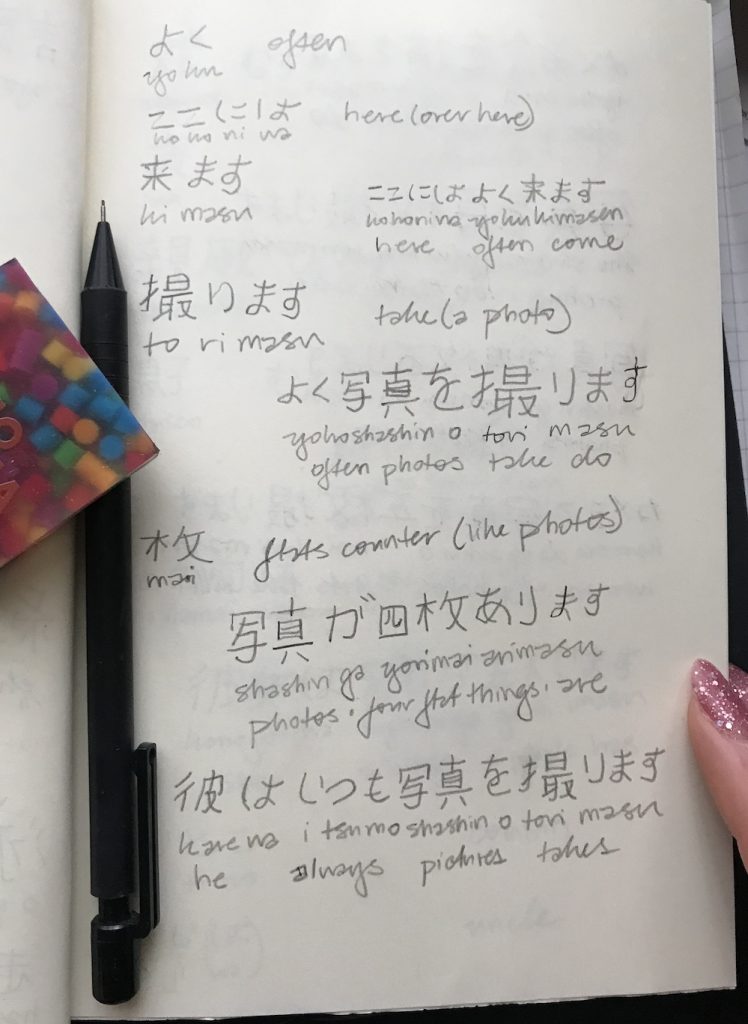
I’m learning the Japanese counting method, where the number is modified by the shape of thing being counted, and it is a tribute to Duolingo that they have introduced this gently enough that I did NOT run away screaming.
I am not super confident that I can recall some of these lessons where multiple new kanji were added, and so I may use the course differently from how I use it for other languages: instead of completing level 1 for all lessons, I may keep stepping up my levels in the early lessons until I really feel comfortable.
SO: Duolingo is a useful tool. You can set your own pace, and use it as a standalone study method (especially if you are already familiar with the languge) or as a supplement to other tools. If games and competition motivate you, you can get competitive in your ‘league’ against other students working at a similar pace. The courses are regularly improved based on the data they see across students. It has options to skip ahead and test out of levels that you are acing. I’m happy to see the addition of Japanese, and the care that went into designing the lessons.
I still recommend it! 🙂
I write in German regularly, but not fluently. What I mean is, my conversational German is okay (I can talk about my life and the weather), my transactional German is okay (I can buy shoes and order food), but my new pen pals keep raising topics I’ve never discussed in German, and so I’m learning new words. Which is GREAT! But… I don’t know how to conjugate the new verbs.
Google Translate (translate.google.com) is nearly magical in its application, and I rely on it while traveling. The image to text instant translations are AMAZING! And the translations are pretty smart. I think I’ve mentioned before that it misses context and nuance, which makes some sense: when I had large Swiss bills and smaller denominations, it offered transformation in place of change, because the nuance is a little different in German: I needed small money. But I knew enough German not to ask for transformation, so it was FINE.
Anyway, Google Translate is my go-to for trying to say new things. However, for all of its excellence, switches between conversational past (I had eaten) and simple past (I ate) in a way that distracts me, and which I don’t seem to influence by my English wording. I want to be more consistent, and this tool, which is called Reverso Conjugator, can help me!

We used conversational past in school, so simple past is kind of exciting – close to how I speak in English, but also unfamiliar in a few ways. So, I’m using it to learn, and it’s been great so far! I recommend it!

I write legal and technical materials professionally, AND I recreationally write a range of other things. Blogs like this, web pages, a surprising number of letters and postcards, diaries, notes for stories, and fiction. Writing is something I have always enjoyed, and I am always writing something, at least for my own satisfaction.
As with so many other fiction writers, the current pandemic has been a wake up call that the popular fictional narratives we have around plagues are not accurate. Yes, in nearly every popular movie, there is a warning from scientists that goes unheeded, and there is needless suffering. Yes, there are rumors and superstitions and panics, and we see those in films and playing out similarly in real life.
Yet, the level of denial visible in real life in response to the global COVID-19 pandemic is shocking. People are devoting significant time to announcing that the pandemic is: a hoax, a domestic conspiracy (despite its global nature), a foreign plot (it is somehow not real but also a foreign bioweapon), a domestic power grab (preventing illness is oppression?), a disease carried by outsiders (again, somehow it is not real but also something strangers bring? WHAT?), something that isn’t real so they flout precautions, something that isn’t real so they sabotage the medicines (but if it isn’t real, why bother sabotaging medicines?), a situation where the vaccine is free but a counterfeit card that falsely claims you were vaccinated costs $400 (so it would be cheaper to go along with the treatment than pretend you did), a private sector plot to embed microchips into people (for generally unexplained purposes, though when they are explained, it always involves something like the location your smartphone already records, which means an additional device would not be necessary)… In this bizarre current reality, the pandemic is somehow BOTH a situation where precautions against catching the illness are banned by a governor AND a situation where that governor’s state requires federal emergency supplies of hospital ventilators and monoclonal antibody treatments for the seriously ill, which the governor suggests people somehow self-medicate with for this illness he says isn’t serious?
If I had written ANY of these things into a fiction story, my writing would have been rejected as implausible. The publishers would have told me that people are not that stupid, and that I should feel bad about making my fellow Americans look so ridiculous.
-I mean, really.
I want people in my fiction writing to be both realistic and smart, but it feels like I can only have one of those two.
I’m sorry, what? https://t.co/KGCWsuqDtp pic.twitter.com/CF0qqqCOoG
— Vera Bergengruen (@VeraMBergen) August 9, 2021
I am inspired to post this after reading the tweet above, about news that a sci-fi movie has been interpreted as reality by the anti-vaccine-far-right (who failed to even grasp basic details about the movie they are basing their nonsensical conspiracies on). Their nonsense has gotten so much press that the screenwriter for this remade sci-fi movie had to make public statements emphasizing that it is fiction:

(It is still strange to read something on Twitter and later find the tweets I read subsequently inspired news articles…)
The past several years have inspired many discussions about the death of parody in the face of an absurd reality, but the current absurd reality also is killing off the premise that the vast majority of people could consistently act intelligently. Maybe we could get to half, or nearly half, but not an overwhelming majority.
I want a future where people ARE actually intelligent. I want to WRITE futures in which people are intelligent!
I suppose my defense for stories with predominantly intelligent populations will be: yes, but I told you this is fiction.